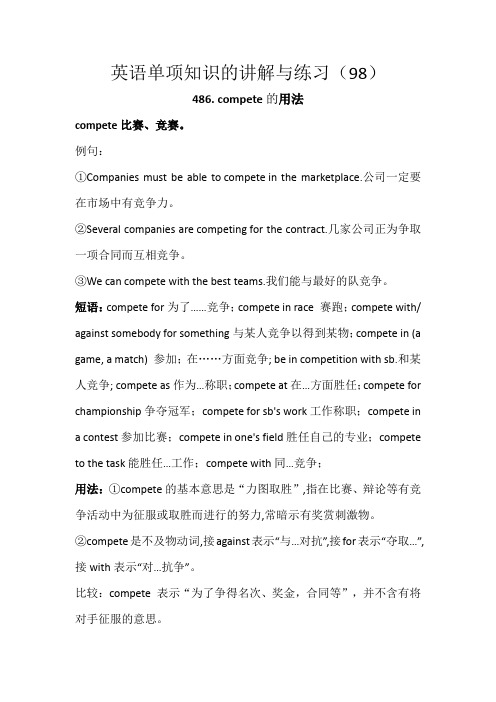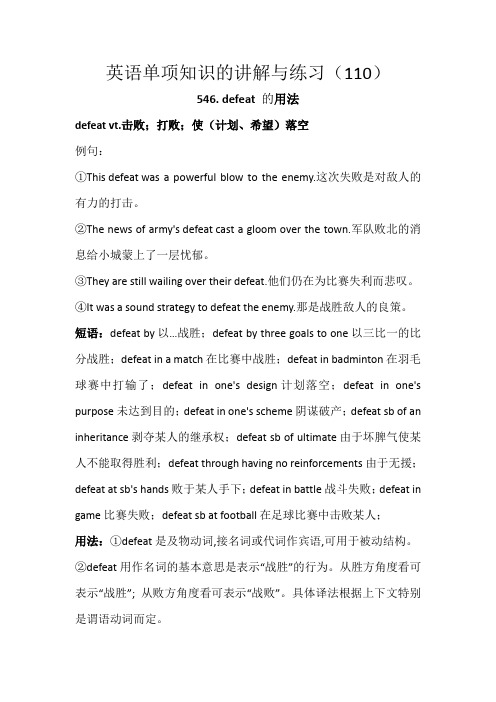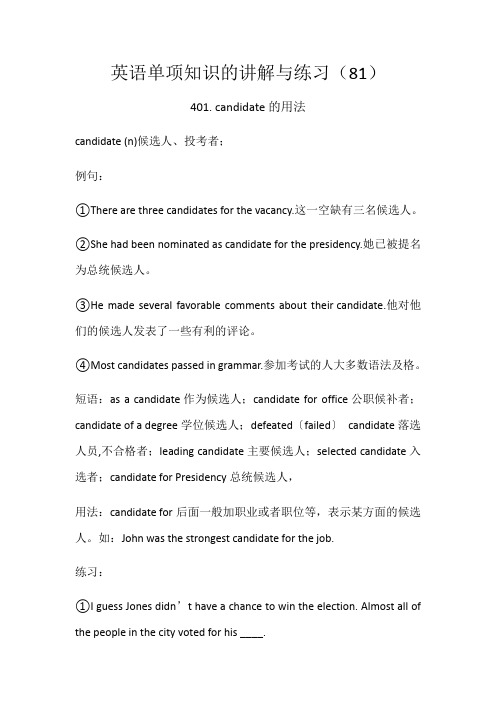英语单项知识的讲解与练习(69)
- 格式:docx
- 大小:27.82 KB
- 文档页数:11

英语单项知识的讲解与练习(98)486. compete的用法compete比赛、竞赛。
例句:①Companies must be able to compete in the marketplace.公司一定要在市场中有竞争力。
②Several companies are competing for the contract.几家公司正为争取一项合同而互相竞争。
③We can compete with the best teams.我们能与最好的队竞争。
短语:compete for为了……竞争;compete in race 赛跑;compete with/ against somebody for something与某人竞争以得到某物;compete in (a game, a match) 参加;在……方面竞争; be in competition with sb.和某人竞争; compete as 作为…称职;compete at 在…方面胜任;compete for championship 争夺冠军;compete for sb's work 工作称职;compete in a contest 参加比赛;compete in one's field 胜任自己的专业;compete to the task 能胜任…工作;compete with 同…竞争;用法:①compete的基本意思是“力图取胜”,指在比赛、辩论等有竞争活动中为征服或取胜而进行的努力,常暗示有奖赏刺激物。
②compete是不及物动词,接against表示“与…对抗”,接for表示“夺取…”,接with表示“对…抗争”。
比较:compete 表示“为了争得名次、奖金,合同等”,并不含有将对手征服的意思。
contest 所表示的竞赛可以是友谊赛,也可以是有敌意的竞赛,旨在比试技能、能力、力气、耐力等,此外还可以表示赢得选举。

英语单项知识的讲解与练习(110)546. defeat的用法defeatvt.击败;打败;使(计划、希望)落空例句:①This defeat was a powerful blow to the enemy.这次失败是对敌人的有力的打击。
②The news of army's defeat cast a gloom over the town.军队败北的消息给小城蒙上了一层忧郁。
③They are still wailing over their defeat.他们仍在为比赛失利而悲叹。
④It was a sound strategy to defeat the enemy.那是战胜敌人的良策。
短语:defeat by 以…战胜;defeat by three goals to one 以三比一的比分战胜;defeat in a match 在比赛中战胜;defeat in badminton 在羽毛球赛中打输了;defeat in one's design 计划落空;defeat in one's purpose 未达到目的;defeat in one's scheme 阴谋破产;defeat sb of an inheritance 剥夺某人的继承权;defeat sb of ultimate 由于坏脾气使某人不能取得胜利;defeat through having no reinforcements 由于无援;defeat at sb's hands 败于某人手下;defeat in battle 战斗失败;defeat in game 比赛失败;defeat sb at football 在足球比赛中击败某人;用法:①defeat是及物动词,接名词或代词作宾语,可用于被动结构。
②defeat用作名词的基本意思是表示“战胜”的行为。
从胜方角度看可表示“战胜”; 从败方角度看可表示“战败”。

一、单复数(偶尔会考,但是错的概率还蛮高的,因为看起来简单,其实更容易忘记。
)1、名词单复数I like bananas (banana) very much. That is an apple (apple).2、be动词单复数(这里要注意过去时,不要忘记看后面的时态)There is (be) a pair of shoes under the bed. Here is (be) some water for you.I am (be) very glad to see you. Tom and I are (be) in the same class. Where were (be) you just now? I was (be) in the playground.3、代词单复数These(this) are rulers. Liu Tao is doing his(their) homework.二、名词所有格(这种题型的更容易错,我的学生就经常错在这个题型上,不是不会做,而是要忘记。
)This is Helen’s (Helen) scarf. Happy Children’s(children) Day.三、人称代词和物主代词1.人称代词—主格(在句中作主语,陈述句中一般在开头,一般疑问句中一般是第二个单词……)We(our) milked cows on the farm yesterday. Does she(her) have a new bike? Which pen do you(your) like? On Christmas Day I(my) got many presents.2.人称代词—宾格(在句中作宾语,一般用在动词或介词后)Let me(mine) have a look. David is behind her(she).3.物主代词—形容词性(用在名词前)What is your(you) job? Miss Li is their(them) English teacher.4.物主代词—名词性(相当于“形容词性物主代词+名词”)The teapot is his(he). Yours(your) is over there.四、基数词和序数词1.基数词表示数量There are five(fifth) birds in the tree.2.序数词表示顺序March is the third(three) month in a year.常见序数词first second third (不要拼错了,学作文时也可以用)五、动词—时态(时态也是一个非常重要的一点,一定要在考试时注意。

英语单项知识的讲解与练习(29)141、no matter how hard it isno matter how ...引导让步状语从句,意为“无论多么……”,how 后跟形容词或副词,相当于“however + adj./adv.”句式。
no matter意为“无论;不管”时,引导让步状语从句,常用于下列句型中:no matter what (who/when etc. )... 分别表示“无论何事”、“无论何人”、“无论何时”等,这个从句可以置于主句之前,也可以置于主句之后。
no matter后接关系代词或关系副词引导的状语从句在句中作让步状语。
no matter what (who, which, where, when … )只能引导让步状语从句;whatever (whoever, whichever, whomever)既可引导让步状语从句,也可引导名词性从句。
no matter 引导的分句表达的是将来的含义,但形式上要用现在时。
如:No matter who will come (改为:comes);no matter 引导的分句不能作宾语或主语。
如:I’ll eat no matter what (改为:whatever) you give me;whichever意为“无论哪个;无论哪些”;whatever意为“无论什么;凡是……的事物”。
whichever可以引导名词性从句或让步状语从句,which是个疑问词;用在疑问句中,或作关系代词,引导定语从句。
no matter which只能引导让步状语从句;而whichever可引导让步状语从句和名词从句。
no matter which可以用whichever代替,但两个同时出现在选项中时,必须选whichever。
练习:①No matter ___ he said, I don’t like him.A. whatB. howC. thatD. why②No matter ___ you go, I will go with you.A. whatB. whichC. whereD. that③That student is discourteous; he complains ___ one tries to please him.A. howeverB. whateverC. no matter whatD. no matter how④_____ the problem may be, we must solve it ourselves.A. Whatever difficultB. How difficultC. However difficultD. No matter what difficult⑤It is generally considered unwise to give a child _____ he or she wants.A. howeverB. whateverC. whicheverD. whenever⑥We’ll eat at _____ restaurant has a free table.A. whichB. whateverC. whicheverD. no matter which⑦These wild flowers are so special that I would_____ do I can to save them.A. whateverB. thatC. whichD. whichever142、mind doing something(1)、mind doing something 通常用于疑问句、否定句和条件句等结构中,这个结构前还可加所有格定语。

英语单项知识的讲解与练习(81)401. candidate的用法candidate (n)候选人、投考者;例句:①There are three candidates for the vacancy.这一空缺有三名候选人。
②She had been nominated as candidate for the presidency.她已被提名为总统候选人。
③He made several favorable comments about their candidate.他对他们的候选人发表了一些有利的评论。
④Most candidates passed in grammar.参加考试的人大多数语法及格。
短语:as a candidate作为候选人;candidate for office公职候补者;candidate of a degree学位候选人;defeated〔failed〕candidate落选人员,不合格者;leading candidate主要候选人;selected candidate入选者;candidate for Presidency总统候选人,用法:candidate for后面一般加职业或者职位等,表示某方面的候选人。
如:John was the strongest candidate for the job.练习:①I guess Jones didn’t have a chance to win the election. Almost all of the people in the city voted for his ____.A. opponentB. candidateC. colleagueD. advocate②They’re interviewing three _____ for the post of sales manager.A. sponsorsB. candidatesC. advocatesD. opponents③They are interviewing candidates _____ the job of sales managers.A.ofB.aboutC.forD.in④This candidate does not _____ the requirement that secondary school should be completed.A.makeB.getC.takeD.meet402. caution 的用法caution (n)小心、谨慎、警告;例句:①The teacher gave Tom a caution and told him never to do it again.老师给了汤姆一次警告,叫他不许再那样做。

英语单项知识的讲解与练习(91)451. budget的用法budget预算、预案;例句:①Congress has approved the new educational budget.国会通过了新的教育预算。
②Our budget needs drastic revision.我们的预算需作重大修改。
③The government has budgeted 10000000 pounds for education spending.政府将10000000英镑编入教育预算。
④If we budget carefully, we'll be able to afford a new house.如果我们精打细算就能买一座新房子了。
⑤You can buy high-quality goods at budget prices there.你可以在那买到物美价廉的商品。
短语:a budget deficit预算赤字;a family budget家庭收支预算;budget one’s time安排自己的时间;budget for the coming year为下一年度编造预算;enlarge budgets 增加预算;exceed a budget 超出预算;annual budget 年度预算;weekly budget 每周的预算;business budget 营业开支;expense budget 开支预算;用法:budget用作名词的基本意思是“预算”,指计划着怎样花钱。
也可指政府一年一度的财政预算,还可指一项计划中的“预算额,经费”。
练习:①Our money is limited and we should ___ for the next year.A. saveB. spareC. limitD. budget②They earn a great deal, but they can’t balance their ___ because the wife is often ill.A. planB. budgetC. projectD. prediction③He is good at ___ his time.A. budgetingB. arrangingC. budgetD. A and B④His father makes a little money, but he can budget ___ his family.A. inB. onC. forD. with452. burn的用法burn燃烧、晒(干)。
初中英语语法知识点详解与习题训练英语是国际交流中最重要的语言之一,掌握好英语语法知识对于学习和运用英语来说至关重要。
在初中英语学习过程中,学生需要掌握一些基本的语法知识点,以便正确地理解和使用英语。
本文将详细介绍一些初中英语语法知识点,并提供相应的习题训练,帮助学生巩固所学知识。
一、单数和复数名词1. 单数名词是指表示一个或一种事物的名词,如“dog”(狗),“book”(书)等。
在句子中,单数名词可以和不定冠词“a”或“an”连用,表示一个或一种事物。
例句:I have a dog.(我有一只狗。
)2. 复数名词是指表示两个或两个以上事物的名词,如“dogs”(狗),“books”(书)等。
在句子中,复数名词可以和定冠词“the”连用,表示特指某些事物。
例句:The dogs are playing in the park.(狗们正在公园里玩。
)练习题:用所给名词的适当形式填空。
1. I have two ________.(apple)2. Please give me a ________.(cup)3. Do you have any ________?(brother)二、形容词的比较级和最高级1. 形容词的比较级用来比较两个人或物的大小、高低、速度等。
规则变化:形容词的比较级通常在词尾加“er”,如“bigger”(更大的),“faster”(更快的)等。
2. 形容词的最高级用来表示三个或三个以上人或物中最大、最高、最快等。
规则变化:形容词的最高级通常在词尾加“est”,如“biggest”(最大的),“fastest”(最快的)等。
练习题:选择合适的词填入句子中。
1. Lucy is ________ than Lily.(tall)2. The elephant is ________ animal in the world.(big)3. This car is ________ than that one.(fast)三、动词的时态1. 现在时态用于描述当前正在发生的事情或经常发生的事情。
英语单项知识的讲解与练习(120)596. earn的用法earnvt. 赚;挣得;获利;赢得;获得例句:①He has earned a lot of money in this month.这个月他已经赚了好多钱了。
②He works hard, but he does not earn much money.他工作很努力,但钱赚得不多。
③How does she earn her living?她靠什么谋生?④His skill in negotiating earned him a reputation as a shrewd tactician.他的谈判技巧使他赢得了精明战略家的名声。
⑤It has taken years to earn their trust.花了好多年才赢得他们的信任。
短语:earn one’s living=make a living 谋生; earn money= make money 挣钱; earn a good reputation 赢得一个好名声; earn sb. sth赢得某人某物;earn by 用…博得;earn by hard labour 靠辛勤劳动挣来的;earn by sweat and toil 靠血汗而挣得的;earn for sb 为某人博得;earn with 用…挣得;用法:①earn可用作及物动词,也可用作不及物动词。
用作及物动词时接名词或代词作宾语。
②earn作“使得到,使赢得”解时,其后还可跟双宾语,其间接宾语也可转化为介词for的宾语。
辨析: earn 侧重指依靠自己的劳动或因付出代价,有功而获得。
obtain 着重指通过巨大努力、要求得到所需或盼望已久的东西。
acquire书面用语,强调通过不断地、持续地努力而获得某物,也指日积月累地获得。
get一般用语,使用较广。
可指以任何方式得到某物,也不一定要经过努力。
gain侧重指经过努力或有意识的行动而取得某种成就,或指获得某种利益或好处。
英语单项知识的讲解与练习(76)376. affair的用法affair事、事情。
短语:That is my affair = Mind your own business = It’s none of your business 这不干你的事(少管闲事);a public/ private affair 公(私)事;the affairs of state国家大事;state of affairs 事态,形势;in a pretty state of affairs 麻烦的处境,处境尴尬;the bottom of affair 这件事的真相;the Ministry of Foreign Aaffair 外交部;on business affairs 因公事;the affair between sb and sb else 某人与某人间的暧昧关系;affair at present 目前的事态;affair of a business 业务;affair of great importance 大事;affair of honor 决斗;affair of love 私通;affair of no consequence 无关紧要的事;affair with sb 与某人的暧昧关系;love affair with travelling 对旅游的强烈爱好;用法:①affair的意思是“事,事情,事务”,含义很广,可指已经发生的、所关心的或必须做的任何事情。
②affair的复数形式(其前不加冠词)不指许多件事,而指重大的或头绪较多的事务。
口语中affair(单数)可模糊地或故意模棱两可地表示“东西”“物品”或“事件”。
③affair的复数形式affairs常指“情形”或“事态”,不指“多件事”。
如:He asked me how affairs stood.他问我情形怎么样了。
注意affairs前没有the。
英语单项知识的讲解与练习(61)301、be surrounded with/ by(1)、surroundings环境,总是用复数,相应的动词也用复数,主要指周围的物质环境。
如:live in pleasant surroundings生活在舒适的环境中;但为了强调整体概念而用了表示单数的指示代词也不算错。
(2)、condition的复数形式conditions可表示“环境,情况”,但主要表示抽象意义上的。
(3)、environment意为“环境”时,既可表示抽象概念也可表示具体意义,包括周围环境、外界、自然环境、社会环境等。
练习:①She has always been ___ with many fashionable friends.A. surroundedB. calledC. organizedD. gathered②___ by a group of children, the old man went on with the story.A. SurroundedB. SurroundingC. To be surroundedD. Being surrounded③We don't see animals in their natural ___ at a zoo.A. surroundingB. surroundingsC. environmentsD. circumstance④A lot of the children at the school do not live in the town, but come from the ___ countryside.A. surroundedB. surroundingC. surroundingsD. surround⑤_____ by the police, the thief had no choice but to surrender(投降).A. SurroundedB. Having surroundedC. To be surroundedD. Surrounding302、survive sb by 15 years(1)、survive in the desert在沙漠中活下来;survive the fire经过大火而活下来;survive sb by 15 years比某人多活15年;survive on sth. = live on sth.靠……生存;(2)、survive作vt,宾语指人,表示比某人(通常是直系亲属)活得长,survive的宾语后可接by,表示“比某人多活……年”;survive 的宾语表示危险、灾难、攻击、动乱等时,表示“幸免于”。
英语单项知识的讲解与练习(69)341、available的用法available可利用的、可达到的、有效的;例句:①Do you have a room available?你们有空房间吗?②The swimming pool is available only in summer.这个游泳池只在夏天开放。
③All sorts of lamps are available in that shop.在那家商店可买到各式各样的灯具。
④The Prime Minister was not available for comment.首相无暇作出评论。
⑤When will the plumber be available?管道工什么时候有空?短语:employ all available means用尽所有办法、千方百计;sb be not available某人不在;make oneself available 使自己可以效劳;make sth available 使某事可利用,使某事可获得;available for 可供…之用的,有效期为,能参加〔出席〕…的;available for export 可供出口的;available for a meeting 能参加会议的;available for three months 有效期为3个月;available to 对…可获得的;用法:①available后接for,表示可供的范围、时间或用处等。
如:The book is available for conference.后接to,介词的宾语多为人,表示“某人可得到或利用”。
如:The serum(血清) is available to the general public(一般公众). 作定语时,常后置。
如:I will send you all particulars (细节)available.②available作“现成可用的; 在手边的; 闲着的”解时不用于比较级。
③available用作表语时,其后还可接动词不定式,该不定式的主动形式可表示主动意义,也可表示被动意义。
练习:①My brother would like to buy a good watch but _____was available from that shop.A.nothingB.noneC.no oneD.neither②Interest is as _____to learning as the ability to understand,even more so.A.vitalB.availableC.specificD.similar③—Can you lend me the book Gone with the Wind?—Sorry.I returned it to the library just now.Maybe it is still _____.A.availableB.affordableC.acceptableD.valuable④—May I speak to Mr.Smith?—I am afraid not. He is at a meeting now.It’s not _____.A.reliableB.convenientC.beneficialD.available⑤I can’t understand why some graduates wouldn’t go to rural areas of our country where large quantities of jobs are _____.A.presentB.suitableC.availableD.convenient⑥—Hello!Friendship Hotel.Can I help you?—Do you have a room with a double bed _____for Saturday?A.availableB.emptyC.possibleeful⑦John once worked in a remote mountain village school,which is _____only on foot.A.acceptableB.accessibleC.availableD.appropriate⑧Wolves are very _____:they can live in forests,on open plains,or in the snows of the Arctic.A.adaptableB.adoptableC.availableD.accessible⑨While college graduates _____a lack of available jobs,factories are facing difficulties in hiring workers.A.carry throughplain ofC.bring aboutD.break in ⑩—Are these seats available?—Sorry, sir. The seats _____.A.have reservedB.are reservedC.reservedD.are reserving342、award的用法award (v/ n) 奖励、奖品、奖金、助学金;例句:①It is impossible to honor her with the award.奖品授给她是不可能的。
②The child smiled at his teacher as he received the award.孩子接过奖品时朝老师微笑着。
③The university awarded him an honorary degree.这所大学授给他名誉学位。
④The champion was awarded the gold medal.冠军被授予了金牌。
短语:award a prize to sb授奖予某人;award sb the title of Combat Hero 授予某人以战斗英雄的称号;be aware that/ wh-从句察觉到、意识到;as far as I’m aware据我所知;用法:award可有双宾语,表示“授予某人某物”。
如:They awarded him the prize. 其宾语后接to,表示授予对象;接for表示授予原因。
如:We award medals to the men for their bravery.比较:award既可作动词也可作名词,指为鼓励在工作中达到或完成所提出的要求或条件的人而进行的奖励,往往强调荣誉而不在乎奖品的大小或奖金的多少。
prize为名词,多指在各类竞赛、竞争或抽彩中所赢得的奖。
这种奖赏有的凭能力获得,有的凭运气获得。
reward既可作动词也可作名词,指对某人的工作或服务等的报答。
也指因帮助警察抓到罪犯或帮助失主找到东西而得到的赏金、酬金。
练习:①After hours of searching,our patience was finally _____and we found the lost kid.A.rewardedB.awardedC.requiredD.balanced②Mo Yan was awarded the Nobel Prize for Literature in 2012,_____made one of the Chinese people’s long-held dreams come true.A.itB.thatC.whatD.which③_____Mo Yan had been awarded the 2012 Nobel prize for Literaturemade us very proud.A.AsB.ThatC.WhichD.What④_____ Mo Yan had been awarded the Nobel Prize for Literature made us Chinese very proud.A. WhatB. WhichC. ThatD. Whether⑤The Swedish academy announced in Stockholm on October 11 that Mo Yan would receive the 2012 Nobel Prize in Literature,_____ him the first Chinese national to win the award.A. makingB. to makeC. having madeD. made⑥Tom’s father made a promise that he would give him a(n)_____if he passed the college entrance examination.A. awardB. prizeC. rewardD. profit⑦The police would offer a(n)_____to anyone who could give some information about the robbery.A. rewardB. awardC. prizeD. Bonus343、aware的用法aware 意识到的、知道的;awareness (n)意识、察觉;例句:①If you were aware of all that, you would change your mind.如果你知道了那一切,你会改变主意的。
②Then he became aware that they were regarding him with interest.这时,他意识到他们都在饶有兴趣地看着他。
短语:be aware of知道、意识到;become aware of发觉、开始意识到;make sb.aware that-clause提醒某人注意……; make sb.aware of ...让某人注意到……;quite aware 很清楚;very aware 十分清楚的;用法:①aware后可接of或that从句。
如:He is aware of her presence.他知道她会出席。
He is aware that we are here.他意识到我们在这。
②aware用在how,what,when等词前时,aware后的of可省略。